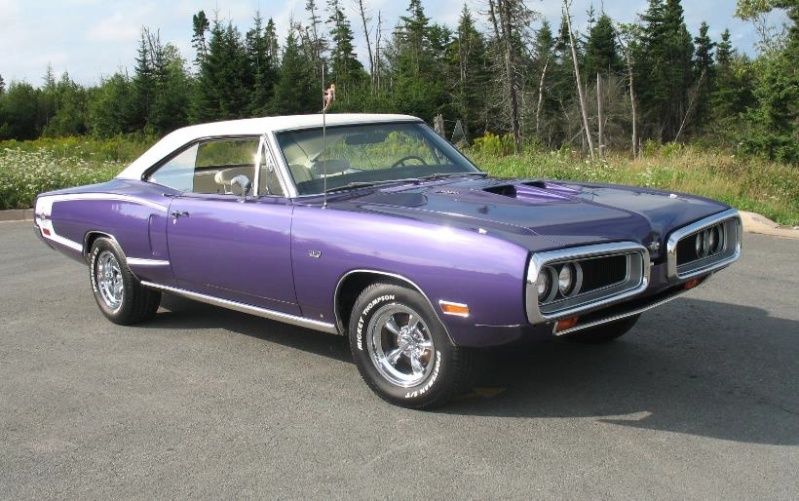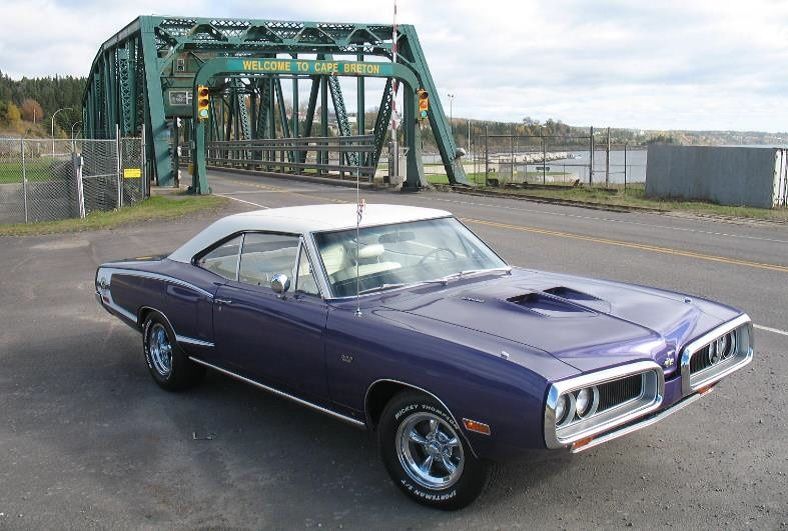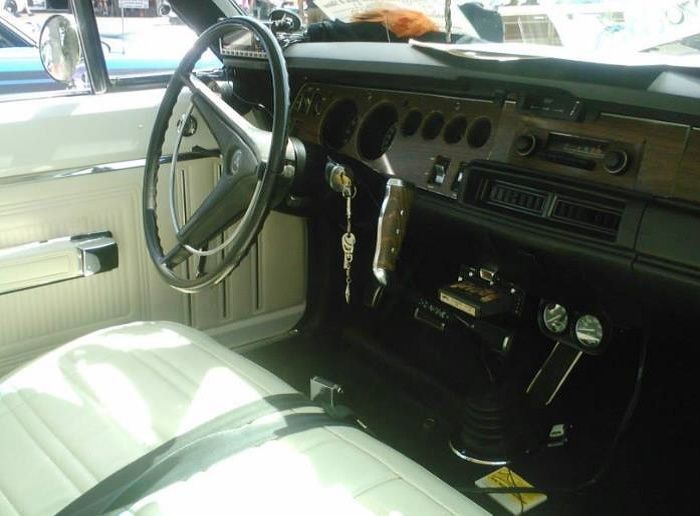Mopar Maritime club car Feature
3 posters
Page 1 of 1
 Mopar Maritime club car Feature
Mopar Maritime club car Feature
posted for J-G L
Member: Bryan Durdle from Eastern Passage, NS
Feature Car: 1970 Dodge Super Bee
Following the runaway sales success of Plymouths Roadrunner in 1968, the head honchos at Dodge seized the opportunity to cash in on their own version of a larger than life and fun car to market to the many returning car-hungry veterans with pockets full of money earned during the Vietnam War.
By the spring of 1968, Dodge decided to stuff the same base 383-cu.in., 335hp V-8 into its Coronet body; add heavy-duty suspension and brakes, a tail stripe and a subtle-but-mild center hood bulge with chrome trim, and voila! The Dodge Super Bee was born. The Super Bee’s 383 benefited from Dodge’s engineers pillaging the 440 parts inventory. Like their counterparts over at Plymouth, Dodge used 440 cylinder heads and camshaft to give the Super Bee more power.

The Super Bee continued through 1969 and by 1970, had a major restyling with a menacing split grille with dual headlamps at each corner. The rear styling also took on a rounded appearance, with handsome split tail lamps at each corner, accented by a die-cast trunk panel. 1970, the car's last year on the Coronet platform, Dodge offered plenty of performance engines. The base engine was the 335hp 383. Next up, Dodge offered a 375hp 440, the now famous 440 Six Pack and, of course, the legendary 426-cu.in. Hemi with 425 horsepower. Just 32 were installed in 1970 Super Bees.
The 1970 Super Bee is quite unique and collectible, with only 15,500 built. The sight of a 1970 Super Bee in your rear-view mirror certainly sets your heart to racing. For 1970, your Super Bee could be had with any of the wild High Impact colors, such as Plum Crazy, Sublime andGo Mango (many of which are making a return on today’s performance Mopars).
Their aggressive color schemes, performance hood and the overall appearance made the 1970 Super Bee look poised to sting at any time.

Bryan’s is the 2nd owner of his 1970 Dodge Coronet Super Bee. Although it was a factory A/C car Bryan removed all of the original A/C components and installed a retro system from Classic Air. The car retains all its original body panels and is painted "Plum Crazy" purple (Code FC-7) with contrasting white vinyl roof, stripe and interior. No power brakes or disc's, drums all around. Stock AM radio was sent out and retro-fitted, retaining the "stock" appearance while upgrading to 180 WPC and is MP3/IPod /IPhone compatible.
The drive train is a 1971 HP 440 (disguised as a 383 as 440 4bbl's were not available underated @ 390. Bryan’s Bee’s a non-console, bench seat car w/an 833 4 speed transmission and an 8 /34 Sure grip w/323 gears.

Member: Bryan Durdle from Eastern Passage, NS
Feature Car: 1970 Dodge Super Bee
Following the runaway sales success of Plymouths Roadrunner in 1968, the head honchos at Dodge seized the opportunity to cash in on their own version of a larger than life and fun car to market to the many returning car-hungry veterans with pockets full of money earned during the Vietnam War.
By the spring of 1968, Dodge decided to stuff the same base 383-cu.in., 335hp V-8 into its Coronet body; add heavy-duty suspension and brakes, a tail stripe and a subtle-but-mild center hood bulge with chrome trim, and voila! The Dodge Super Bee was born. The Super Bee’s 383 benefited from Dodge’s engineers pillaging the 440 parts inventory. Like their counterparts over at Plymouth, Dodge used 440 cylinder heads and camshaft to give the Super Bee more power.

The Super Bee continued through 1969 and by 1970, had a major restyling with a menacing split grille with dual headlamps at each corner. The rear styling also took on a rounded appearance, with handsome split tail lamps at each corner, accented by a die-cast trunk panel. 1970, the car's last year on the Coronet platform, Dodge offered plenty of performance engines. The base engine was the 335hp 383. Next up, Dodge offered a 375hp 440, the now famous 440 Six Pack and, of course, the legendary 426-cu.in. Hemi with 425 horsepower. Just 32 were installed in 1970 Super Bees.
The 1970 Super Bee is quite unique and collectible, with only 15,500 built. The sight of a 1970 Super Bee in your rear-view mirror certainly sets your heart to racing. For 1970, your Super Bee could be had with any of the wild High Impact colors, such as Plum Crazy, Sublime andGo Mango (many of which are making a return on today’s performance Mopars).
Their aggressive color schemes, performance hood and the overall appearance made the 1970 Super Bee look poised to sting at any time.

Bryan’s is the 2nd owner of his 1970 Dodge Coronet Super Bee. Although it was a factory A/C car Bryan removed all of the original A/C components and installed a retro system from Classic Air. The car retains all its original body panels and is painted "Plum Crazy" purple (Code FC-7) with contrasting white vinyl roof, stripe and interior. No power brakes or disc's, drums all around. Stock AM radio was sent out and retro-fitted, retaining the "stock" appearance while upgrading to 180 WPC and is MP3/IPod /IPhone compatible.
The drive train is a 1971 HP 440 (disguised as a 383 as 440 4bbl's were not available underated @ 390. Bryan’s Bee’s a non-console, bench seat car w/an 833 4 speed transmission and an 8 /34 Sure grip w/323 gears.


Keith Mopar- Posts : 1444
Join date : 2015-01-20
Age : 65
Location : Calgary AB
 70 Super Bee
70 Super Bee
Thanks for posting Keith!...I think this car is very very nice.

JGL- Posts : 4619
Join date : 2015-01-21
Age : 71
Location : Dieppe NB
 Re: Mopar Maritime club car Feature
Re: Mopar Maritime club car Feature
Yeah that is just awesome Keith, Thanks for sharing!

69ChargerR/TSE- Posts : 27
Join date : 2015-02-03
Location : BC
Page 1 of 1
Permissions in this forum:
You cannot reply to topics in this forum